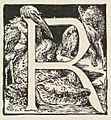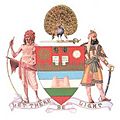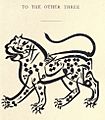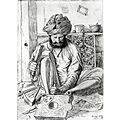John Lockwood Kipling facts for kids
Quick facts for kids
John Lockwood Kipling
|
|
|---|---|
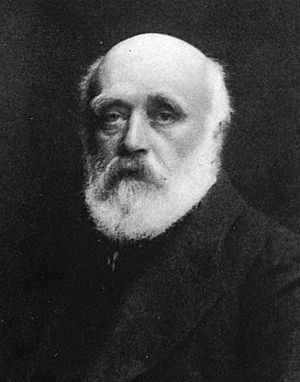
Portrait of J. Lockwood Kipling, by Hollinger.
|
|
| Born | 6 July 1837 Pickering, North Yorkshire, England |
| Died | 26 January 1911 (aged 73) Tisbury, Wiltshire, England |
| Occupation | Art teacher, illustrator, museum curator |
John Lockwood Kipling (born July 6, 1837 – died January 26, 1911) was a talented English art teacher, illustrator, and museum expert. He spent most of his working life in British India, which is now countries like India, Pakistan, and Bangladesh. He was also the father of the very famous writer Rudyard Kipling, who wrote The Jungle Book!
Contents
Early Life and Moving to India
John Lockwood Kipling was born in a town called Pickering, North Yorkshire, England. He went to a school called Woodhouse Grove School. Later, while working in a place called Burslem, he met his future wife, Alice MacDonald. You can still see some of his designs on the outside of the Wedgwood Institute building there.
Alice was the daughter of a minister. John and Alice got married in 1865. Soon after, they moved to India. John had a new job as a professor of architectural sculpture at the Jeejeebhoy School of Art in Bombay (which is now called Mumbai). He later became the head of that school.
Family Life in India
Their son, Rudyard Kipling, was born in December 1865, not long after they arrived in India. He was named Rudyard after a place in England where his parents had first met. Their daughter, Alice Kipling, was born in 1868.
From 1870 to 1872, the government asked Kipling to travel around different parts of India, like the Punjab and Kashmir. His job was to draw pictures of Indian craftspeople, old buildings, and interesting sights. Many of these drawings are now kept at the Victoria and Albert Museum in London. Some were also printed in books.
Working at the Mayo School of Art
In 1875, Kipling became the head of the Mayo School of Arts in Lahore, British India (which is now in Pakistan). He also became the curator of the old Lahore Museum. This museum was so famous that it was called the "Wonder House" or Ajaib Ghar in his son Rudyard's famous book, Kim. John Lockwood Kipling moved back to England in 1893.
Artistic Contributions and Designs
Kipling was a very skilled artist. He drew pictures for many of Rudyard Kipling's books, and also for other books like Tales of the Punjab. He also helped decorate the Victoria and Albert Museum in London. He designed the detailed carvings, called friezes, on the Crawford Market building in Bombay. These carvings show scenes like traders, porters, and bullock carts.
John Kipling also designed the uniforms and decorations for a big event in Delhi in 1877. This event was organized by the Viceroy of India, Lord Lytton. At this event, Queen Victoria was declared the Empress of India.
Supporting Local Artists
While he was the head of the Mayo School of Art, Kipling was a great supporter of local Indian artists. He helped train them and taught them how to become skilled craftspeople and designers. One of his students, Bhai Ram Singh, even helped him decorate the Durbar Room at Osborne House in England. Kipling was also the editor of a magazine called Journal of Indian Art and Industry, which featured drawings made by students from the Mayo School.
Later Life and Legacy
John Lockwood Kipling passed away in 1911. He is buried in the churchyard of Tisbury, Wiltshire, England. In 2017, there was a special exhibition of his work called John Lockwood Kipling: Arts & Crafts in the Punjab and London.
Images for kids
-
A carving (bas-relief) from a series illustrating the book Kim.
See also
 In Spanish: John Lockwood Kipling para niños
In Spanish: John Lockwood Kipling para niños




